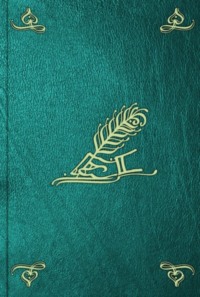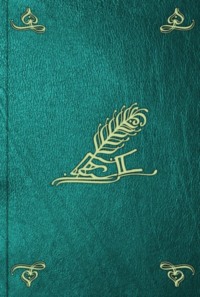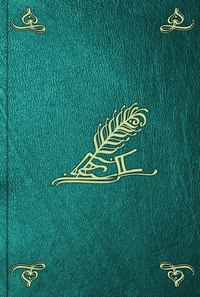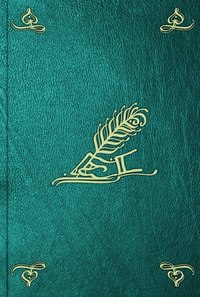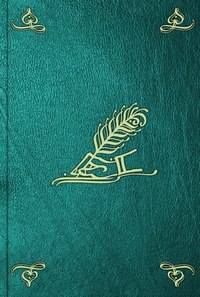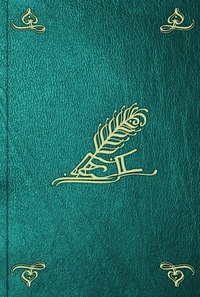 полная версия
полная версияMore Letters of Charles Darwin — Volume 1
(277/1. The following letter refers to a book, "Toledoth Adam," written by a learned Jew with the object of convincing his co-religionists of the truth of the theory of evolution. The translation we owe to the late Henry Bradshaw, University Librarian at Cambridge. The book is unfortunately no longer to be found in Mr. Darwin's library.)
{1876}.
To the Lord, the Prince, who "stands for an ensign of the people" (Isa. xi. 10), the Investigator of the generation, the "bright son of the morning" (Isa. xiv. 12), Charles Darwin, may he live long!
"From the rising of the sun and from the west" (Isa. xlv. 6) all the nations know concerning the Torah (Theory) (277/2. Lit., instruction. The Torah is the Pentateuch, strictly speaking, the source of all knowledge.) which has "proceeded from thee for a light of the people" (Isa. li. 4), and the nations "hear and say, It is truth" (Isa. xliii. 9). But with "the portion of my people" (Jer. x. 16), Jacob, "the lot of my inheritance" (Deut. xxxii. 9), it is not so. This nation, "the ancient people" (Isa. xliv. 7), which "remembers the former things and considers the things of old (Isa. xliii. 18), "knows not, neither doth it understand" (Psalm lxxxii. 5), that by thy Torah (instruction or theory) thou hast thrown light upon their Torah (the Law), and that the eyes of the Hebrews (277/3. One letter in this word changed would make the word "blind," which is what Isaiah uses in the passage alluded to.) "can now see out of obscurity and out of darkness" (Isa. xxix. 18). Therefore "I arose" (Judges v. 7) and wrote this book, "Toledoth Adam" ("the generations of man," Gen. v. 1), to teach the children of my people, the seed of Jacob, the Torah (instruction) which thou hast given for an inheritance to all the nations of the earth.
And I have "proceeded to do a marvellous work among this people, even a marvellous work and a wonder" (Isa. xxix. 14), enabling them now to read in the Torah of Moses our teacher, "plainly and giving the sense" (Neh. viii. 8), that which thou hast given in thy Torahs (works of instruction). And when my people perceive that thy view has by no means "gone astray" (Num. v. 12, 19, etc.) from the Torah of God, they will hold thy name in the highest reverence, and "will at the same time glorify the God of Israel" (Isa. xxix. 23).
"The vision of all this" (Isa. xxix. 11) thou shalt see, O Prince of Wisdom, in this book, "which goeth before me" (Gen. xxxii. 21); and whatever thy large understanding finds to criticise in it, come, "write it in a table and note it in a book" (Isa. xxx. 8); and allow me to name my work with thy name, which is glorified and greatly revered by
Thy servant, Naphtali Hallevi {i.e. the Levite}.
Dated here in the city of Radom, in the province of Poland, in the month of Nisan in the year 636, according to the lesser computation (i.e. A.M. {5}636 = A.D. 1876).
LETTER 278. TO OTTO ZACHARIAS. 1877.
When I was on board the "Beagle" I believed in the permanence of species, but, as far as I can remember, vague doubts occasionally flitted across my mind. On my return home in the autumn of 1836 I immediately began to prepare my journal for publication, and then saw how many facts indicated the common descent of species (278/1. "The facts to which reference is here made were, without doubt, eminently fitted to attract the attention of a philosophical thinker; but until the relations of the existing with the extinct species and of the species of the different geographical areas, with one another were determined with some exactness, they afforded but an unsafe foundation for speculation. It was not possible that this determination should have been effected before the return of the "Beagle" to England; and thus the date which Darwin (writing in 1837) assigns to the dawn of the new light which was rising in his mind becomes intelligible." — From "Darwiniana," Essays by Thomas H. Huxley, London, 1893; pages 274-5.), so that in July, 1837, I opened a notebook to record any facts which might bear on the question; but I did not become convinced that species were mutable until, I think, two or three years had elapsed. (278/2. On this last point see page 38.)
LETTER 279. TO G.J. ROMANES.
(279/1. The following letter refers to MS. notes by Romanes, which we have not seen. Darwin's remarks on it are, however, sufficiently clear.)
My address will be "Bassett, Southampton," June 11th {1877}.
I have received the crossing paper which you were so kind as to send me. It is very clear, and I quite agree with it; but the point in question has not been a difficulty to me, as I have never believed in a new form originating from a single variation. What I have called unconscious selection by man illustrates, as it seems to me, the same principle as yours, within the same area. Man purchases the individual animals or plants which seem to him the best in any respect — some more so, and some less so — and, without any matching or pairing, the breed in the course of time is surely altered. The absence in numerous instances of intermediate or blending forms, in the border country between two closely allied geographical races or close species, seemed to me a greater difficulty when I discussed the subject in the "Origin."
With respect to your illustration, it formerly drove me half mad to attempt to account for the increase or diminution of the productiveness of an organism; but I cannot call to mind where my difficulty lay. (279/2. See Letters 209-16.) Natural Selection always applies, as I think, to each individual and its offspring, such as its seeds, eggs, which are formed by the mother, and which are protected in various ways. (279/3. It was in regard to this point that Romanes had sent the MS. to Darwin. In a letter of June 16th he writes: "It was with reference to the possibility of Natural Selection acting on organic types as distinguished from individuals, — a possibility which you once told me did not seem at all clear.") There does not seem any difficulty in understanding how the productiveness of an organism might be increased; but it was, as far as I can remember, in reducing productiveness that I was most puzzled. But why I scribble about this I know not.
I have read your review of Mr. Allen's book (279/4. See "Nature" (June 7th, 1877, page 98), a review of Grant Allen's "Physiological Aesthetics."), and it makes me more doubtful, even, than I was before whether he has really thrown much light on the subject.
I am glad to hear that some physiologists take the same view as I did about your giving too much credit to H. Spencer — though, heaven knows, this is a rare fault. (279/5. The reference is to Romanes' lecture on Medusa, given at the Royal Institution, May 25th. (See "Nature," XVI., pages 231, 269, 289.) It appears from a letter of Romanes (June 6th) that it was the abstract in the "Times" that gave the impression referred to. References to Mr. Spencer's theories of nerve-genesis occur in "Nature," pages 232, 271, 289.)
The more I think of your medusa-nerve-work the more splendid it seems to me.
LETTER 280. TO A. DE CANDOLLE. Down, August 3rd, 1877.
I must have the pleasure of thanking you for your long and interesting letter. The cause and means of the transition from an hermaphrodite to a unisexual condition seems to me a very perplexing problem, and I shall be extremely glad to read your remarks on Smilax, whenever I receive the essay which you kindly say that you will send me. (280/1. "Monographiae Phanerogamarum," Volume I. In his treatment of the Smilaceae, De Candolle distinguishes: — Heterosmilax which has dioecious flowers without a trace of aborted stamens or pistils, Smilax with sterile stamens in the female flowers, and Rhipogonum with hermaphrodite flowers.) There is much justice in your criticisms (280/2. The passage criticised by De Candolle is in "Forms of Flowers" (page 7): "It is a natural inference that their corollas have been increased in size for this special purpose." De Candolle goes on to give an account of the "recherche linguistique," which, with characteristic fairness, he undertook to ascertain whether the word "purpose" differs in meaning from the corresponding French word "but.") on my use of the terms object, end, purpose; but those who believe that organs have been gradually modified for Natural Selection for a special purpose may, I think, use the above terms correctly, though no conscious being has intervened. I have found much difficulty in my occasional attempts to avoid these terms, but I might perhaps have always spoken of a beneficial or serviceable effect. My son Francis will be interested by hearing about Smilax. He has dispatched to you a copy of his paper on the glands of Dipsacus (280/3. "Quart. Journ. Mic. Sci." 1877.), and I hope that you will find time to read it, for the case seems to me a new and highly remarkable one. We are now hard at work on an attempt to make out the function or use of the bloom or waxy secretion on the leaves and fruit of many plants; but I doubt greatly whether our experiments will tell us much. (280/4. "As it is we have made out clearly that with some plants (chiefly succulent) the bloom checks evaporation — with some certainly prevents attacks of insects; with some sea-shore plants prevents injury from salt-water, and I believe, with a few prevents injury from pure water resting on the leaves." (See letter to Sir W. Thiselton-Dyer, "Life and Letters," III., page 341. A paper on the same subject by Francis Darwin was published in the "Journ. Linn. Soc." XXII.)) If you have any decided opinion whether plants with conspicuously glaucous leaves are more frequent in hot than in temperate or cold, in dry than in damp countries, I should be grateful if you would add to your many kindnesses by informing me. Pray give my kind remembrances to your son, and tell him that my son has been trying on a large scale the effects of feeding Drosera with meat, and the results are most striking and far more favourable than I anticipated.
LETTER 281. TO G.J. ROMANES.
(281/1. Published in the "Life and Letters" of Romanes, page 66.)
Down, Saturday Night {1877}.
I have just finished your lecture (281/2. "The Scientific Evidence of Organic Evolution: a Discourse" (delivered before the Philosophical Society of Ross-shire), Inverness, 1877. It was reprinted in the "Fortnightly Review," and was afterwards worked up into a book under the above title.); it is an admirable scientific argument, and most powerful. I wish that it could be sown broadcast throughout the land. Your courage is marvellous, and I wonder that you were not stoned on the spot — and in Scotland! Do please tell me how it was received in the Lecture Hall. About man being made like a monkey (page 37 (281/3. "And if you reject the natural explanation of hereditary descent, you can only suppose that the Deity, in creating man, took the most scrupulous pains to make him in the image of the ape" ("Discourse," page 37).)) is quite new to me, and the argument in an earlier place (page 8 (281/4. At page 8 of the "Discourse" the speaker referred to the law "which Sir William Hamilton called the Law of Parsimony — or the law which forbids us to assume the operation of higher causes when lower ones are found sufficient to explain the desired effects," as constituting the "only logical barrier between Science and Superstition.")) on the law of parsimony admirably put. Yes, page 21 (281/5. "Discourse," page 21. If we accept the doctrines of individual creations and ideal types, we must believe that the Deity acted "with no other apparent motive than to suggest to us, by every one of the observable facts, that the ideal types are nothing other than the bonds of a lineal descent.") is new to me. All strike me as very clear, and, considering small space, you have chosen your lines of reasoning excellently.
The few last pages are awfully powerful, in my opinion.
Sunday Morning. — The above was written last night in the enthusiasm of the moment, and now — this dark, dismal Sunday morning — I fully agree with what I said.
I am very sorry to hear about the failures in the graft experiments, and not from your own fault or ill-luck. Trollope in one of his novels gives as a maxim of constant use by a brickmaker — "It is dogged as does it" (281/6. "Tell 'ee what, Master Crawley; — and yer reverence mustn't think as I means to be preaching; there ain't nowt a man can't bear if he'll only be dogged. You go whome, Master Crawley, and think o' that, and may be it'll do ye a good yet. It's dogged as does it. It ain't thinking about it." (Giles Hoggett, the old Brickmaker, in "The Last Chronicle of Barset," Volume II., 1867, page 188.)) — and I have often and often thought that this is the motto for every scientific worker. I am sure it is yours — if you do not give up pangenesis with wicked imprecations.
By the way, G. Jager has brought out in "Kosmos" a chemical sort of pangenesis bearing chiefly on inheritance. (281/7. Several papers by Jager on "Inheritance" were published in the first volume of "Kosmos," 1877.)
I cannot conceive why I have not offered my garden for your experiments. I would attend to the plants, as far as mere care goes, with pleasure; but Down is an awkward place to reach.
Would it be worth while to try if the "Fortnightly" would republish it {i.e. the lecture}?
LETTER 282. TO T.H. HUXLEY.
(282/1. In 1877 the honorary degree of LL.D. was conferred on Mr. Darwin by the University of Cambridge. At the dinner given on the occasion by the Philosophical Society, Mr. Huxley responded to the toast of the evening with the speech of which an authorised version is given by Mr. L. Huxley in the "Life and Letters" of his father (Volume I., page 479). Mr. Huxley said, "But whether the that doctrine {of evolution} be true or whether it be false, I wish to express the deliberate opinion, that from Aristotle's great summary of the biological knowledge of his time down to the present day, there is nothing comparable to the "Origin of Species," as a connected survey of the phenomena of life permeated and vivified by a central idea."
In the first part of the speech there was a brilliant sentence which he described as a touch of the whip "tied round with ribbons," and this was perhaps a little hard on the supporters of evolution in the University. Mr. Huxley said "Instead of offering her honours when they ran a chance of being crushed beneath the accumulated marks of approbation of the whole civilised world, the University has waited until the trophy was finished, and has crowned the edifice with the delicate wreath of academic appreciation.")
Down, Monday night, November 19th {1877}.
I cannot rest easy without telling you more gravely than I did when we met for five minutes near the Museum, how deeply I have felt the many generous things (as far as Frank could remember them) which you said about me at the dinner. Frank came early next morning boiling over with enthusiasm about your speech. You have indeed always been to me a most generous friend, but I know, alas, too well how greatly you overestimate me. Forgive me for bothering you with these few lines.
(282/2. The following extract from a letter (February 10th, 1878) to his old schoolfellow, Mr. J. Price, gives a characteristic remark about the honorary degree.)
"I am very much obliged for your kind congratulations about the LL.D. Why the Senate conferred it on me I know not in the least. I was astonished to hear that the R. Prof. of Divinity and several other great Dons attended, and several such men have subscribed, as I am informed, for the picture for the University to commemorate the honour conferred on me."
LETTER 283. TO W. BOWMAN.
(283/1. We have not discovered to what prize the following letter to the late Sir W. Bowman (the well known surgeon) refers.)
Down, February 22nd, 1878.
I received your letter this morning, and it was quite impossible that you should receive an answer by 4 p.m. to-day. But this does not signify in the least, for your proposal seems to me a very good one, and I most entirely agree with you that it is far better to suggest some special question rather than to have a general discussion compiled from books. The rule that the Essay must be "illustrative of the wisdom and beneficence of the Almighty" would confine the subjects to be proposed. With respect to the Vegetable Kingdom, I could suggest two or three subjects about which, as it seems to me, information is much required; but these subjects would require a long course of experiment, and unfortunately there is hardly any one in this country who seems inclined to devote himself to experiments.
LETTER 284. TO J. TORBITT.
(284/1. Mr. Torbitt was engaged in trying to produce by methodical selection and cross-fertilisation a fungus-proof race of the potato. The plan is fully described in the "Life and Letters," III., page 348. The following letter is given in additional illustration of the keen interest Mr. Darwin took in the project.)
Down, Monday, March 4th, 1878.
I have nothing good to report. Mr. Caird called upon me yesterday; both he and Mr. Farrer (284/2. The late Lord Farrer.) have been most energetic and obliging. There is no use in thinking about the Agricultural Society. Mr. Caird has seen several persons on the subject, especially Mr. Carruthers, Botanist to the Society. He (Mr. Carruthers) thinks the attempt hopeless, but advances in a long memorandum sent to Mr. Caird, reasons which I am convinced are not sound. He specifies two points, however, which are well worthy of your consideration — namely, that a variety should be tested three years before its soundness can be trusted; and especially it should be grown under a damp climate. Mr. Carruthers' opinion on this head is valuable because he was employed by the Society in judging the varieties sent in for the prize offered a year or two ago. If I had strength to get up a memorial to Government, I believe that I could succeed; for Sir J. Hooker writes that he believes you are on the right path; but I do not know to whom else to apply whose judgment would have weight with Government, and I really have not strength to discuss the matter and convert persons.
At Mr. Farrer's request, when we hoped the Agricultural Society might undertake it, I wrote to him a long letter giving him my opinion on the subject; and this letter Mr. Caird took with him yesterday, and will consider with Mr. Farrer whether any application can be made to Government.
I am, however, far from sanguine. I shall see Mr. Farrer this evening, and will do what I can. When I receive back my letter I will send it to you for your perusal.
After much reflection it seems to me that your best plan will be, if we fail to get Government aid, to go on during the present year, on a reduced scale, in raising new cross-fertilised varieties, and next year, if you are able, testing the power of endurance of only the most promising kind. If it were possible it would be very advisable for you to get some grown on the wet western side of Ireland. If you succeed in procuring a fungus-proof variety you may rely on it that its merits would soon become known locally and it would afterwards spread rapidly far and wide. Mr. Caird gave me a striking instance of such a case in Scotland. I return home to-morrow morning.
I have the pleasure to enclose a cheque for 100 pounds. If you receive a Government grant, I ought to be repaid.
P.S. If I were in your place I would not expend any labour or money in publishing what you have already done, or in sending seeds or tubers to any one. I would work quietly on till some sure results were obtained. And these would be so valuable that your work in this case would soon be known. I would also endeavour to pass as severe a judgment as possible on the state of the tubers and plants.
LETTER 285. TO E. VON MOJSISOVICS. Down, June 1st, 1878.
I have at last found time to read {the} first chapter of your "Dolomit Riffe" (285/1. "Dolomitriffe Sudtirols und Venetiens." Wien, 1878.), and have been exceedingly interested by it. What a wonderful change in the future of geological chronology you indicate, by assuming the descent-theory to be established, and then taking the graduated changes of the same group of organisms as the true standard! I never hoped to live to see such a step even proposed by any one. (285/2. Published in "Life and Letters," III., pages 234, 235.)
Nevertheless, I saw dimly that each bed in a formation could contain only the organisms proper to a certain depth, and to other there existing conditions, and that all the intermediate forms between one marine species and another could rarely be preserved in the same place and bed. Oppel, Neumayr, and yourself will confer a lasting and admirable service on the noble science of Geology, if you can spread your views so as to be generally known and accepted.
With respect to the continental and oceanic periods common to the whole northern hemisphere, to which you refer, I have sometimes speculated that the present distribution of the land and sea over the world may have formerly been very different to what it now is; and that new genera and families may have been developed on the shores of isolated tracts in the south, and afterwards spread to the north.
LETTER 286. TO J.W. JUDD. Down, June 27th, 1878.
I am heartily glad to hear of your intended marriage. A good wife is the supreme blessing in this life, and I hope and believe from what you say that you will be as happy as I have been in this respect. May your future geological work be as valuable as that which you have already done; and more than this need not be wished for any man. The practical teaching of Geology seems an excellent idea.
Many thanks for Neumayr, (286/1. Probably a paper on "Die Congerien und Paludinenschichten Slavoniens und deren Fauna. Ein Beitrag zur Descendenz-Theorie," "Wien. Geol. Abhandl." VII. (Heft 3), 1874-82.), but I have already received and read a copy of the same, or at least of a very similar essay, and admirably good it seemed to me.
This essay, and one by Mojsisovics (286/2. See note to Letter 285.), which I have lately read, show what Palaeontology in the future will do for the classification and sequence of formations. It delighted me to see so inverted an order of proceeding — viz., the assuming the descent of species as certain, and then taking the changes of closely allied forms as the standard of geological time. My health is better than it was a few years ago, but I never pass a day without much discomfort and the sense of extreme fatigue.
(286/3. We owe to Professor Judd the following interesting recollections of Mr. Darwin, written about 1883: —
"On this last occasion, when I congratulated him on his seeming better condition of health, he told me of the cause for anxiety which he had in the state of his heart. Indeed, I cannot help feeling that he had a kind of presentiment that his end was approaching. When I left him, he insisted on conducting me to the door, and there was that in his tone and manner which seemed to convey to me the sad intelligence that it was not merely a temporary farewell, though he himself was perfectly cheerful and happy.
"It is impossible for me adequately to express the impression made upon my mind by my various conversations with Mr. Darwin. His extreme modesty led him to form the lowest estimate of his own labours, and a correspondingly extravagant idea of the value of the work done by others. His deference to the arguments and suggestions of men greatly his juniors, and his unaffected sympathy in their pursuits, was most marked and characteristic; indeed, he, the great master of science, used to speak, and I am sure felt, as though he were appealing to superior authority for information in all his conversations. It was only when a question was fully discussed with him that one became conscious of the fund of information he could bring to its elucidation, and the breadth of thought with which he had grasped it. Of his gentle, loving nature, of which I had so many proofs, I need not write; no one could be with him, even for a few minutes, without being deeply impressed by his grateful kindliness and goodness.")



